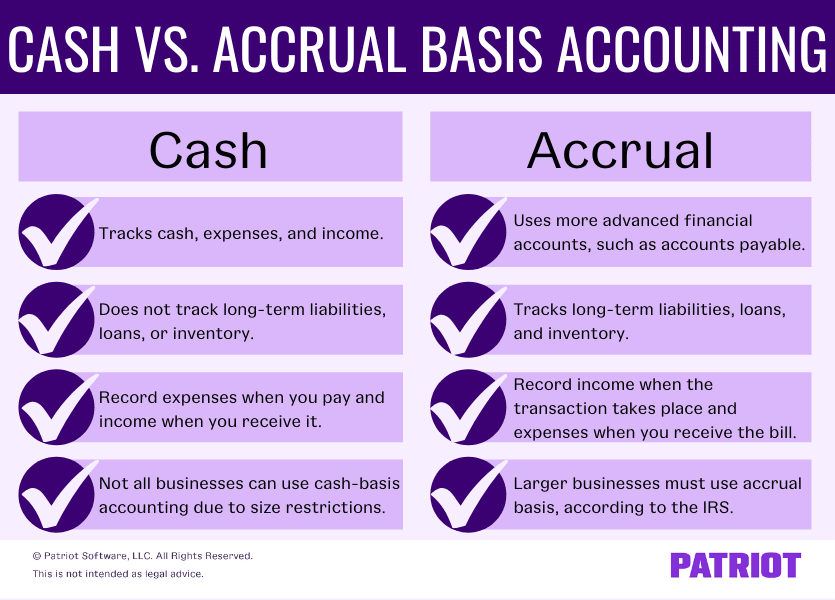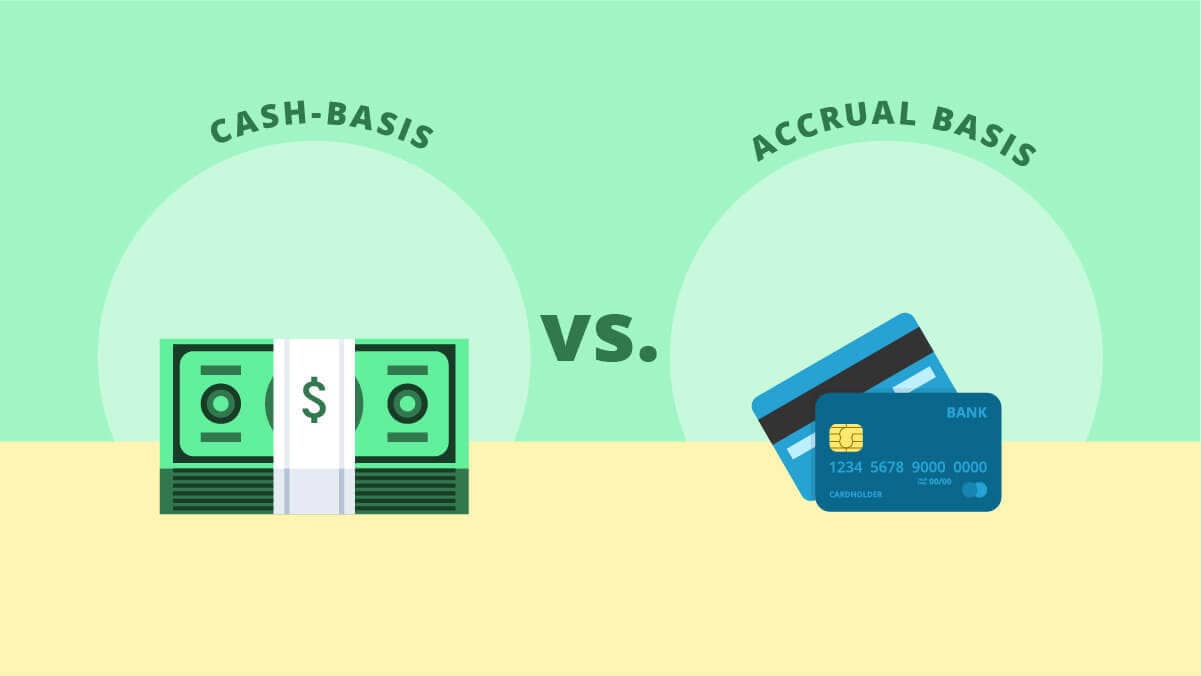Business owners have a lot of decisions to make, especially in the beginning. One of the most important decisions is how to handle bookkeeping for your business. There are three methods of accounting to choose from: Cash-basis, modified cash-basis, and accrual accounting.
The two methods that differ the most are accrual and cash-basis accounting. Modified cash-basis accounting is a hybrid of the two. To help determine the method that best fits your business’s needs, compare accrual vs. cash-basis accounting. And, review accounting laws to ensure you stay compliant.
Accrual vs. cash-basis accounting
To pick the best accounting method for your business, you must understand the differences between cash basis and accrual basis. Compare and contrast cash basis vs. accrual basis below.
Cash-basis accounting
Of all three accounting methods, cash-basis accounting is the easiest. Because of its ease of use, many small businesses prefer this method for their bookkeeping.
Accounting
Cash-basis accounting only lets you use cash accounts to track and record transactions. You can record things like cash, expenses, and income with the cash-basis method. But, you cannot track long-term liabilities, loans, or inventory.
Businesses using cash basis record income when they receive it. And, you record expenses when you pay them. Do not record income or expenses at the time you send or receive a bill with cash-basis accounting.
Pros and cons
Advantages of cash-basis accounting include:
- Simple and easy to use
- Ideal for small businesses
- Cheaper than other methods
- Less information to track
- Easier to maintain
There are some cons to cash basis, too, including:
- Restrictions on which businesses can use it
- Businesses typically can’t use this method as the company grows
- Fewer available accounts (e.g., can’t track long-term financial items)
Balance sheet
The cash basis balance sheet includes three parts: assets, liabilities, and equity. The balance sheet does not track or record accounts payable, accounts receivable, or inventory with this method. So, your balance sheet does not include any unpaid invoices or expenses.
Accounts on the cash basis balance sheet include:
- Cash
- Equity
- Income
- Cost of goods sold (COGS)
Accrual accounting
Accrual accounting is the most complex accounting method available. And, it is the only method accepted by GAAP (generally accepted accounting principles). Generally, you must have some accounting knowledge to use accrual-based accounting.
Accounting
A big difference between cash basis and accrual basis is that accrual accounting uses more advanced financial accounts. These accounts include accounts payable, current assets, long-term liabilities, and inventory.
The other difference between cash and accrual is when you record transactions. With accrual basis, record income when your transaction takes place, with or without the transfer of money. And, record expenses when you receive the bill.
Pros and cons
There are a few advantages to using accrual accounting, including:
- Anticipating future income and expenses
- Projecting and viewing long-term profitability
- Helping you make smart financial plans
- Accessing many types of accounts for transactions
But, there are also some cons to using accrual accounting, including:
- Being more complex than other accounting methods
- Needing more accounting knowledge to use it
Balance sheet
The balance sheet for accrual accounting includes more details and additional accounts. Accounts on the accrual basis balance sheet include:
- Cash
- Equity
- Income
- Cost of goods sold
- Expense
- Accounts receivable
- Fixed assets
- Current assets
- Accounts payable
- Long-term liabilities
- Current liabilities
Comparing cash basis vs. accrual basis
Again, accrual basis is more complex than cash basis. And, accrual basis uses more accounts than cash-basis accounting. Take a look at how cash basis compares to accrual basis:

Modified cash-basis accounting
Now that we’ve explained the difference between cash and accrual accounting, let’s go over the third accounting method: modified cash-basis accounting. Also known as hybrid accounting, this method blends parts of cash and accrual accounting together. Businesses that need to record and balance both short- and long-term transactions find this method ideal.
Modified cash basis uses accounts from both cash and accrual basis, including:
- Cash
- Current assets
- Accounts payable
- Long-term liabilities
The method allows you to record short-term items like cash-basis accounting. But, you can also include long-term items (e.g., business loans) like you can with accrual accounting.
Accounting method laws
Again, there are restrictions on which businesses can use cash-basis accounting. And, fewer businesses can use cash basis as the company grows. But, why is that?
The IRS restricts which businesses can use cash-basis accounting to record their transactions. Larger businesses cannot use cash basis. You cannot use cash basis if you meet any of the following conditions:
- Are a corporation (but not an S Corp) with average annual gross receipts for the three preceding tax years exceeding $25 million
- Are a partnership with a corporation (not an S Corp) as a partner with average annual gross receipts for the three preceding tax years exceeding $25 million
- Operate as a tax shelter
If your business currently uses cash-basis accounting and meets or exceeds the IRS restrictions, you must switch accounting methods. Use IRS Form 3115, Application for Change in Accounting Method, to make the change.
Examples of cash accounting vs. accrual
Take a look at a few examples of recording income and expenses using the different accounting methods. Before checking your answers, test your knowledge on accrual and cash-basis accounting.
Recording expenses
1. Julia orders some supplies for her business. She uses the cash-basis method. When does she record the expense in her accounting books?
- When the supplies are delivered
- Before the supplies are delivered
- When she pays for the supplies
2. Say Julia is using the accrual accounting method instead of cash-basis. When would she record the supplies?
- Before the supplies are delivered
- When the supplies are delivered
- When she pays for the supplies
Answers: 1. C and 2. B
Recording income
1. John owns a marketing agency. He completed a project for a customer and is ready to be paid. At what point does he record his income with cash-basis accounting?
- When the client pays the invoice
- As soon as he completes the project and sends the invoice
- Right after he finishes the project, but before invoicing the client
2. John finishes a project for another client. Let’s say he’s using the accrual method. When will John record his income with the accrual accounting method?
- When the client pays the invoice
- Right after he finishes the project, but before invoicing the client
- As soon as he completes the project and sends the invoice
Answers: 1. A and 2. C
Here is a quick cheat sheet to use for recording transactions:
| Cash Basis | Modified Cash Basis | Accrual Basis | |
|---|---|---|---|
| Available Accounts | Cash Accounts Only | Cash & Accrual Accounts | Cash & Accrual Accounts |
| Record Income | When Paid | When Paid | When Invoiced |
| Record Expenses | When Paid | When Paid | When Billed |
Should I use cash or accrual accounting? Questions
Which method should your business use: Cash accounting or accrual accounting? Use the following four questions before making a decision.
1. Am I required by the IRS to use accrual accounting?
First and foremost, ask yourself which accounting method you can use. Are you able to use cash basis? Or, are you required to use accrual based on IRS requirements?
If you’re unsure if your business meets the conditions to use accrual accounting, do your research. Find out if your business is required to use one method or another if you:
- Are a corporation or partnership
- Operate as a tax shelter
- Have gross receipts exceeding $25 million for the three preceding tax years
- Sell good or services on credit
- Need inventory to account for income
Consider also consulting an accounting professional if you are on the fence about which accounting method you need to use.
2. How much accounting experience do I have?
If you’re not required to use a certain accounting method, then you can go ahead with either option (woohoo!). But before you dive into one method or another, you should consider what kind of learning curve the method has.
Because cash basis uses fewer accounts and is simpler, it can be easier to pick up on for business owners. Not to mention, it is less time-consuming than using the accrual method.
If you’re willing to learn how to use more complex accounts or already have some accounting knowledge, accrual accounting may be a better fit for you.
So before you decide on a method, ask yourself:
- How much accounting knowledge and experience do I have?
- Do I have time to learn a more complex accounting method?
- What kind of learning curve does the method have?
The last thing you want to do is dive right into a method that’s too complex for your business and that you do not have time to learn. Weigh your options beforehand to avoid stressing out about your books and making accounting errors.
3. Will my business grow in the next few years?
Do you anticipate business growth in the next few years? If so, you may want to lean toward the accrual accounting route.
Businesses can outgrow accounting methods just like they can outgrow buildings when they hire additional employees. At some point, your business may become too large for the cash-basis method. And if that happens, you need to change from cash to accrual.
So before you choose the cash method of accounting, determine how much growth your business will have over the next few years. If you think you’ll outgrow the cash method, consider going with the accrual method to save you time in the long run.
4. How complex is my business?
Last but not least, consider the complexity of your business before making a decision on your accounting method.
Look at things like the size of your business, how many employees you have, your industry, and your number of accounts. If your business is complex and growing at a rapid pace, you may want to steer clear of using cash-basis accounting and go with accrual instead. That way, you can see the big picture of your business’s books and finances.
How do you change from cash basis to accrual?
As mentioned, growing businesses may need to change their accounting method and file Form 3115. But before submitting Form 3115, you must make a few changes to your books.
Complete the following steps to adjust your books and reflect the shift in accounting methods:
- Add prepaid and accrued expenses
- Add accounts receivable
- Subtract cash payments, customer prepayments, and cash receipts
After you make the necessary changes to your books, file Form 3115. The earlier you file the form, the better. Attach your profit and loss statement, balance sheets, and any adjustments from the previous year to the form when you submit it.
How to choose an accounting method
Your business needs are unique, so it’s important to pick the accounting method that fits your company. Before making your decision, consider a few factors.
Think about things like:
- Accounting laws you must follow
- How big your business is
- How much your business will grow over time
- Future accounting needs
- Types of transactions you need to record
- Which types of accounts you need (e.g., long-term liabilities)
This article has been updated from its original publication date of July 29, 2013.
This is not intended as legal advice; for more information, please click here.


